| Listing 1 - 10 of 14 | << page >> |
Sort by
|
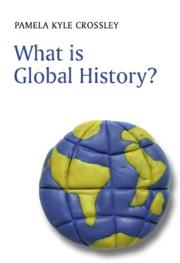
ISBN: 9780745633008 9780745633015 9780475633008 0745633005 0745633013 Year: 2008 Publisher: Cambridge Polity press
Abstract | Keywords | Export | Availability | Bookmark
 Loading...
Loading...Choose an application
- Reference Manager
- EndNote
- RefWorks (Direct export to RefWorks)
History as a science --- World history --- World history. --- Histoire universelle --- Histoire globale --- Weltgeschichte --- Weltgeschichte.
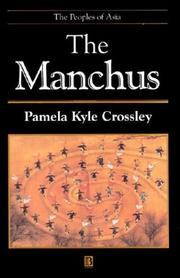
ISBN: 1557865604 Year: 1997 Volume: *1 Publisher: Cambridge (Mass.): Blackwell
Abstract | Keywords | Export | Availability | Bookmark
 Loading...
Loading...Choose an application
- Reference Manager
- EndNote
- RefWorks (Direct export to RefWorks)
S22/0500 --- S22/0200 --- Manchus --- -Manchu (Manchurian people) --- Ethnology --- Tatars --- Tungusic peoples --- North-eastern provinces (Manchuria)--History: general and before 1931 --- North-eastern provinces (Manchuria)--General works --- History --- China --- -China -- History -- Qing dynasty, 1644-1912. --- Manchus -- History. --- History. --- China -- History -- Qing dynasty, 1644-1912. --- -North-eastern provinces (Manchuria)--History: general and before 1931 --- -S22/0500 --- Cina --- Kinë --- Cathay --- Chinese National Government --- Chung-kuo kuo min cheng fu --- Republic of China (1912-1949) --- Kuo min cheng fu (China : 1912-1949) --- Chung-hua min kuo (1912-1949) --- Kina (China) --- National Government (1912-1949) --- China (Republic : 1912-1949) --- People's Republic of China --- Chinese People's Republic --- Chung-hua jen min kung ho kuo --- Central People's Government of Communist China --- Chung yang jen min cheng fu --- Chung-hua chung yang jen min kung ho kuo --- Central Government of the People's Republic of China --- Zhonghua Renmin Gongheguo --- Zhong hua ren min gong he guo --- Kitaĭskai︠a︡ Narodnai︠a︡ Respublika --- Činská lidová republika --- RRT --- Republik Rakjat Tiongkok --- KNR --- Kytaĭsʹka Narodna Respublika --- Jumhūriyat al-Ṣīn al-Shaʻbīyah --- RRC --- Kitaĭ --- Kínai Népköztársaság --- Chūka Jinmin Kyōwakoku --- Erets Sin --- Sin --- Sāthāranarat Prachāchon Čhīn --- P.R. China --- PR China --- Chung-kuo --- Zhongguo --- Zhonghuaminguo (1912-1949) --- Zhong guo --- Chine --- République Populaire de Chine --- República Popular China --- Catay --- VR China --- VRChina --- 中國 --- 中国 --- 中华人民共和国 --- Jhongguó --- Bu̇gu̇de Nayiramdaxu Dundadu Arad Ulus --- Bu̇gu̇de Nayiramdaqu Dumdadu Arad Ulus --- Bu̇gd Naĭramdakh Dundad Ard Uls --- Khi︠a︡tad --- Kitad --- Dumdadu Ulus --- Dumdad Uls --- Думдад Улс --- Kitajska --- Qing dynasty, 1644-1912 --- Manchus - History. --- China - History - Ch°ing dynasty, 1644-1912.
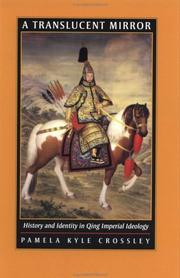
ISBN: 0520234243 0520234243 0520215664 Year: 1999 Publisher: Berkeley University of California press
Abstract | Keywords | Export | Availability | Bookmark
 Loading...
Loading...Choose an application
- Reference Manager
- EndNote
- RefWorks (Direct export to RefWorks)
"In this exploration of the origins of nationalism and concepts of racial identity in China, Pamela Kyle Crossley traces the shifting ideologies of a large, early modern land-based empire, the Qing (1636-1912). Drawing on a wide variety of primary sources, Crossley argues that motifs introduced under the Qing in the eighteenth century - part of the crystallizing categories of identity that the Qing themselves promoted - continue to distort the modern understanding of Qing origins. What has often been repudiated by nationalist foes of empire, it turns out, is frequently itself a creation of empire."--Jacket.
Nationalism --- Nationalisme --- China --- Chine --- Politics and government --- Politique et gouvernement --- S06/0205 --- S04/0680 --- S02/0200 --- China: Politics and government--Government and political institutions: Qing --- China: History--Qing: general: 1644 - 1912 --- China: General works--Civilization and culture --- Nationalism -- China. --- China -- Politics and government -- 1644-1912.
Book
ISBN: 9781405160797 1405160799 9781405160803 1405160802 Year: 2010 Publisher: Chichester Wiley-Blackwell
Abstract | Keywords | Export | Availability | Bookmark
 Loading...
Loading...Choose an application
- Reference Manager
- EndNote
- RefWorks (Direct export to RefWorks)
"This comprehensive but concise narrative of China since the eighteenth century builds its story around the delicate relationship between central government and local communities." "The author argues that China's modern history has not wholly adhered to the ideal of the "unwobbling pivot", with China as a wholly harmonious society based on principles of stability. Instead Crossley argues that developments can be explained through an understanding of China's surprising swings between centralization and decentralization, between local initiative and central authoritarianism. The author's approach is broad enough to provide a full introduction to modern Chinese history. Students new to the subject will be suppported with timelines, maps, illustrations, and extensive notes for further reading, while those with a background in Chinese will find an underlying theme in the narrative addressing long-standing interpretive issues."--Jacket.
Central-local government relations --- Central-local government relations. --- History --- Geschichte 1800-1900. --- Geschichte 1900-2000. --- Since 1800. --- China --- China. --- Relations gouvernement central-collectivités locales --- History. --- Histoire. --- Chine --- Histoire --- Center-periphery government relations --- Local-central government relations --- Local government-central government relations --- Political science --- Decentralization in government --- Federal government --- S04/0705 --- S06/0205 --- S06/0210 --- S06/0220 --- China: History--Modern history, China: after 1840 --- China: Politics and government--Government and political institutions: Qing --- China: Politics and government--Republic: 1911 - 1949 --- China: Politics and government--People's Republic: general --- Relations gouvernement central-collectivités locales

ISBN: 0520928849 0585371105 9780520928848 9780585371108 0520215664 9780520215665 0520215664 Year: 1999 Publisher: Berkeley University of California Press
Abstract | Keywords | Export | Availability | Bookmark
 Loading...
Loading...Choose an application
- Reference Manager
- EndNote
- RefWorks (Direct export to RefWorks)
"In this exploration of the origins of nationalism and concepts of racial identity in China, Pamela Kyle Crossley traces the shifting ideologies of a large, early modern land-based empire, the Qing (1636-1912). Drawing on a wide variety of primary sources, Crossley argues that motifs introduced under the Qing in the eighteenth century - part of the crystallizing categories of identity that the Qing themselves promoted - continue to distort the modern understanding of Qing origins. What has often been repudiated by nationalist foes of empire, it turns out, is frequently itself a creation of empire."--Jacket.
Nationalism --- China --- Politics and government
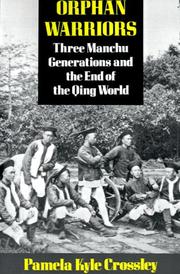
ISBN: 0691008779 Year: 1991 Publisher: Princeton, NJ Princeton Univ. Press
Abstract | Keywords | Export | Availability | Bookmark
 Loading...
Loading...Choose an application
- Reference Manager
- EndNote
- RefWorks (Direct export to RefWorks)
In the mid-1600s, Manchu bannermen spearheaded the military force that conquered China and founded the Qing Empire, which endured until 1912. By the end of the Taiping War in 1864, however, the descendants of these conquering people were coming to terms with a loss of legal definition, an ever-steeper decline in living standards, and a sense of abandonment by the Qing court. Focusing on three generations of a Manchu family (from 1750 to the 1930s), Orphan Warriors is the first attempt to understand the social and cultural life of the bannermen within the context of the decay of the Qing regime. The book reveals that the Manchus were not "sinicized," but that they were growing in consciousness of their separate ethnicity in response to changes in their own position and in Chinese attitudes toward them. Pamela Kyle Crossley's treatment of the Suwan Guwalgiya family of Hangzhou is hinged upon Jinliang (1878-1962), who was viewed at various times as a progressive reformer, a promising scholar, a bureaucratic hack, a traitor, and a relic. The author sees reflected in the ambiguities of his persona much of the plight of other Manchus as they were transformed from a conquering caste to an ethnic minority. Throughout Crossley explores the relationships between cultural decline and cultural survival, polity and identity, ethnicity and the disintegration of empires, all of which frame much of our understanding of the origins of the modern world.
Manchus --- China --- Social life and customs. --- History, 1644-1912. --- History --- Geschichte. --- Militär --- Waisenkind --- Mandschu --- Mandschu (Volk) --- China. --- Albazinians. --- Anhui. --- Annam. --- Babojab. --- Bogue. --- Britain. --- Buddhism. --- Canton (Guangzhou). --- Changxi. --- Chen Tianhua. --- Dai Xi. --- Dong Fuxiang. --- Eight Trigrams Rebellion. --- Enming. --- Fujian. --- Gelao hui. --- Gong Zizhen. --- Guan Tianpei. --- Guanyin. --- Guizhou. --- Hangzhou. --- Heilongjiang (province). --- Hualianbu. --- Hulun federation. --- Jiangxi. --- Jingshan diary. --- Johnston, Reginald. --- Kang Youwei. --- Korea and Koreans. --- Kuoputongwu. --- Li Hongzhang. --- Liang Qichao. --- Manchukuo. --- Manwen xuexiao. --- Ming dynasty. --- Mongolian banners. --- Nanjing. --- New Army. --- adoption. --- banishment. --- black markets. --- children. --- clans. --- corruption. --- divination. --- education. --- examinations. --- foreign aid and advisors. --- fuxiaoqi canling. --- genealogy. --- hanjian. --- homelessness. --- identity. --- imperial archives. --- indemnities. --- irregulars. --- magistracy. --- mercenaries. --- opium addiction. --- Cina --- Kinë --- Cathay --- Chinese National Government --- Chung-kuo kuo min cheng fu --- Republic of China (1912-1949) --- Kuo min cheng fu (China : 1912-1949) --- Chung-hua min kuo (1912-1949) --- Kina (China) --- National Government (1912-1949) --- China (Republic : 1912-1949) --- People's Republic of China --- Chinese People's Republic --- Chung-hua jen min kung ho kuo --- Central People's Government of Communist China --- Chung yang jen min cheng fu --- Chung-hua chung yang jen min kung ho kuo --- Central Government of the People's Republic of China --- Zhonghua Renmin Gongheguo --- Zhong hua ren min gong he guo --- Kitaĭskai︠a︡ Narodnai︠a︡ Respublika --- Činská lidová republika --- RRT --- Republik Rakjat Tiongkok --- KNR --- Kytaĭsʹka Narodna Respublika --- Jumhūriyat al-Ṣīn al-Shaʻbīyah --- RRC --- Kitaĭ --- Kínai Népköztársaság --- Chūka Jinmin Kyōwakoku --- Erets Sin --- Sin --- Sāthāranarat Prachāchon Čhīn --- P.R. China --- PR China --- PRC --- P.R.C. --- Chung-kuo --- Zhongguo --- Zhonghuaminguo (1912-1949) --- Zhong guo --- Chine --- République Populaire de Chine --- República Popular China --- Catay --- VR China --- VRChina --- 中國 --- 中国 --- 中华人民共和国 --- Jhongguó --- Bu̇gu̇de Nayiramdaxu Dundadu Arad Ulus --- Bu̇gu̇de Nayiramdaqu Dumdadu Arad Ulus --- Bu̇gd Naĭramdakh Dundad Ard Uls --- BNKhAU --- БНХАУ --- Khi︠a︡tad --- Kitad --- Dumdadu Ulus --- Dumdad Uls --- Думдад Улс --- Kitajska --- China (Republic : 1949- ) --- Mandschuren --- Manchu --- Tungusen --- Alleinstehendes Kind --- Allein stehendes Kind --- Waise --- Elternloses Kind --- Kind --- Heimkind --- Heerwesen --- Kriegswesen --- Streitkräfte --- Wehrwesen --- Armee --- Rüstung --- Militärwesen
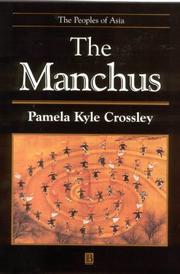
ISBN: 0631235914 Year: 2002 Publisher: Oxford : Blackwell,
Abstract | Keywords | Export | Availability | Bookmark
 Loading...
Loading...Choose an application
- Reference Manager
- EndNote
- RefWorks (Direct export to RefWorks)
Book
ISBN: 0691055831 Year: 1990 Publisher: Princeton Princeton University Press
Abstract | Keywords | Export | Availability | Bookmark
 Loading...
Loading...Choose an application
- Reference Manager
- EndNote
- RefWorks (Direct export to RefWorks)
Book
ISBN: 9780691224985 Year: 2022 Publisher: Princeton, NJ
Abstract | Keywords | Export | Availability | Bookmark
 Loading...
Loading...Choose an application
- Reference Manager
- EndNote
- RefWorks (Direct export to RefWorks)
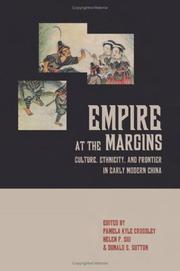
ISBN: 1282356569 0520927532 9786612356568 1598759248 9780520927537 1423745426 9781423745426 9781598759242 9780520230156 0520230159 9781282356566 6612356561 Year: 2006 Publisher: Berkeley University of California Press
Abstract | Keywords | Export | Availability | Bookmark
 Loading...
Loading...Choose an application
- Reference Manager
- EndNote
- RefWorks (Direct export to RefWorks)
Focusing on the Ming (1368-1644) and (especially) the Qing (1364-1912) eras, this book analyzes crucial moments in the formation of cultural, regional, and religious identities. The contributors examine the role of the state in a variety of environments on China's "peripheries," paying attention to shifts in law, trade, social stratification, and cultural dialogue. They find that local communities were critical participants in the shaping of their own identities and consciousness as well as the character and behavior of the state. At certain times the state was institutionally definitive, but it could also be symbolic and contingent. They demonstrate how the imperial discourse is many-faceted, rather than a monolithic agent of cultural assimilation.
Ethnicity --- Ethnic identity --- Group identity --- Cultural fusion --- Multiculturalism --- Cultural pluralism --- History. --- China --- Ethnic relations --- S11/1210 --- History --- China: Social sciences--Works on the national minorities and special groups in China: general and before 1949 (Tibetans, Mongols etc. see Tibet, Mongolia ... but social relations between Chinese and these minorities come here) --- asia. --- avars. --- bandits. --- chinese culture. --- chinese history. --- colonialism. --- conquest. --- dan. --- empire. --- ethnicity. --- foreign policy. --- frontier. --- gender. --- guizhou. --- hainan highlands. --- han. --- history. --- imperialism. --- independence. --- islam. --- kingdoms. --- kitans. --- manchu. --- miao. --- ming dynasty. --- ming empire. --- mongols. --- mountains. --- muslim. --- nationalism. --- nonfiction. --- pearl river. --- pirates. --- provinces. --- qiang. --- qing empire. --- qing law. --- race. --- rebellion. --- religion. --- resistance. --- smuggling. --- social order. --- tusi. --- uyghurs. --- war. --- women in history. --- yao wars. --- yao. --- yunnan.
| Listing 1 - 10 of 14 | << page >> |
Sort by
|

 Search
Search Feedback
Feedback About UniCat
About UniCat  Help
Help News
News